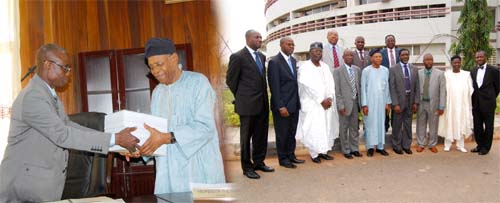
Left: Prof. Oluwafemi Olaiya Balogun handing over Comprehensive Documents on the University To the Panel Leader, Prof. Ochapa Onazi. Right: A group Photograph of members of the Presidential Panel with Principal Officers of the University
The Presidential Visitation Panel to the University of Agriculture, Abeokuta, has kick-started its assignment with a courtesy visit on the Vice-Chancellor, Professor Oluwafemi Olaiya Balogun.
The seven-man Panel is under the Chairmanship of Professor Ochapa Onazi, who was a former Vice-Chancellor of the University of Jos and also a former Pro-Chancellor of the Bayero University, Kano.
The Panel members include a former Head of Service to the Jigawa State Government, Dr. Ayuba Tanko Abubakar; a notable Pharmacist, Hon. Toye Oke and a Political Scientist, Dr. G.A Ogwuche. Others are, Mr. Yemi Adetunji, a Fellow of the Institute of Chartered Accountants of Nigeria; Architect Kester Ifeadi with a staff of the National Universities Commission, Engr. Kayode Odedina as Secretary.
Welcoming the members of the Panel, the Vice-Chancellor, Professor Balogun, asserted that the University had witnessed tremendous development from a humble beginning, despite its inability to benefit from the traditional take-off grant from the Federal Government.
The Vice-Chancellor, however, lamented that the University was still faced with numerous challenges, predicated on shortage of funds. He said, “this University is yet to receive the traditional take-off grant from the Federal Government, its proprietor, decades after its creation”.
Professor Balogun also pleaded with the Federal Government to release the 46 percent balance of the allocation shortfall of the Year 2010 budget, saying “the funds released were insufficient to successfully complete earlier earmarked projects”.
Professor Balogun said for the University to achieve its calling, in the aspect of teaching and research, it operates eight Colleges and 39 academic Departments with 1,777 academic and other support staff.
The Vice-Chancellor further availed the Panel of the robust community relations, peace, stability and favourable ranking as currently enjoyed in the University.
Documents, chronicling activities of the University from 2005 to 2010 were later presented by the Vice-Chancellor to the Panel, to serve as working papers and reference materials for their four-week assignment.
Responding, the Panel Chairman, Professor Onazi, commended the Management of the University for what he described as “a glaring evidence of development”. According to him, “I couldn’t believe myself when I stepped into the Campus, beautiful sceneries, beautiful buildings. It takes a lot to maintain the lawn alone”.
The Chairman said the Panel, as recently inaugurated, was for the purpose of assisting the Visitor to the University, to determine the state of health and levels of development of individual Federal University in Nigeria.
Professor Onazi said, “we want to ensure that the claims of development are matched with physical evidence on ground”. According to him, the Panel was not inaugurated to witch-hunt anybody or interest while it will not take frivolous or anonymous memorandum from members of the University Community.
The Panel later met with Deans, Directors and representatives of all strata of interests in the University.
The Terms of Reference of the Panel are:
To inquire into the level of implementation of the White Paper on the last visitation report;
To look into the leadership quality of each University, in terms of the roles of Governing Council, the Vice-Chancellors and other Principal Officers;
To look into the financial management of each institution, including Statutory Allocations and Internally- Generated Revenue over the recommended period and determine whether it was in compliance with appropriate regulations;
To investigate the application of funds, particularly, the special grants, loans meant for specific projects, in order to determine the status of such projects and their relevance, for further funding;
To examine the adequacy of the staff and staff development programmes of each University;
To determine the relationship between the University and the various statutory bodies it interacts with according to its law, for the purposes of supervision, planning, finance, discipline, guidance and any other relationship the University may have in dealing with the said bodies including the Governing Council, the National Universities Commission and the Federal Ministry of Education as well as the Visitor;
To examine the “Law” establishing the University, including the relationship between the various internal organs, units and offices and indicate the way the law has been observed by the competent authorities and also suggest any modifications to the law; considered necessary or desirable, to enable the University to better achieve its objectives;
To trace the historical evolution of the University and take stock of its net achievements and problems as well as its style and sense of direction and advice on what fundamental or expedient corrections are needed to enable the University to better achieve the objectives set for it;
To examine the general security in the University, how the University has dealt with it and recommend appropriate measures to deal with it;
To examine the processes and structures of the mechanisms for the discipline of students in each University, in order to ascertain compliance with due process of the rule of law.
